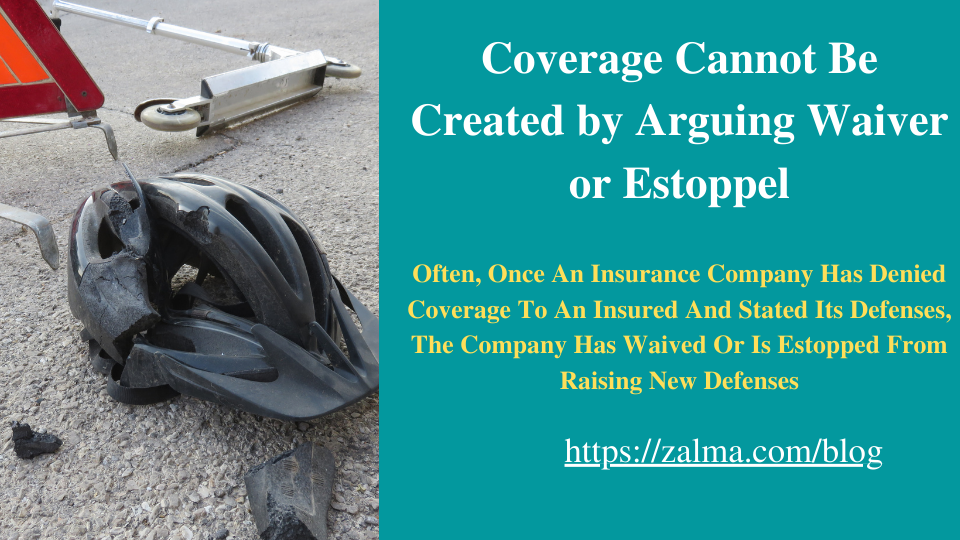Coverage Can't Be Created by Waiver or Estoppel

Often, Once An Insurance Company Has Denied Coverage To An Insured And Stated Its Defenses, The Company Has Waived Or Is Estopped From Raising New Defenses
Read the full article at https://lnkd.in/g7H-Scmy and at https://zalma.com/blog plus more than 4200 posts.
After an accident involving plaintiff and non-party Michael Ragland who struck plaintiff while he was traveling through a crosswalk on an electric scooter. In Christopher Carter v. Owners Insurance Company, doing business as Auto-Owners Insurance Company, No. 356556, Court of Appeals of Michigan (May 12, 2022) Carter sought no-fault benefits because of the reason used by the insurer was not effective.
Because plaintiffs injuries did not arise from his “ownership, operation, maintenance, or use of a motor vehicle as a motor vehicle,” defendant was not obliged under MCL 500.3163(1) to cover plaintiffs PIP expense.
ESTOPPEL
Where a party gives a reason for his conduct and decision touching any thing involved in a controversy, he cannot, after litigation has begun, change his ground, and put his conduct upon another and a different consideration. Stated differently, “once an insurance company has denied coverage to an insured and stated its defenses, the company has waived or is estopped from raising new defenses.”
Allowing the limits of a policy to be expanded by estoppel or waiver involved instances where the inequity of forcing the insurer to pay on a risk for which it never collected premiums is outweighed by the inequity suffered by the insured because of the insurance company’s actions.
Plaintiff is asking for defendant to be estopped from asserting a basis for nonliability other than the reason given in its initial denial letter. This would, in effect, broaden the coverage of defendant’s policy, such that it would cover a loss it never covered by its terms and create a liability contrary to the express provisions of the contract the parties did make.
Plaintiff was prejudiced but not by defendant’s belated argument under MCL 500.3163 but by his decision to not name Farm Bureau as a defendant despite being informed by defendant that Farm Bureau was the insurer liable for his claim.
Therefore, the trial court erred as a matter of law in employing principles of waiver and estoppel to expand defendant’s insurance coverage under the policy at issue.
ZALMA OPINION
Insurance is a contract. It should always be enforced as written. In this case the insurer mistakenly rejected the claim for a reason not available but learned, later, a reason that was appropriate. Because the injured party sued the wrong defendant and tried to change a policy by claiming waiver, he lost both.
(c) 2022 Barry Zalma & ClaimSchool, Inc.
Barry Zalma, Esq., CFE, is available at http://www.zalma.com and [email protected].
Subscribe to Zalma on Insurance at locals.com https://zalmaoninsurance.local.com/subscribe.
Subscribe to Excellence in Claims Handling at https://barryzalma.substack.com/welcome.
We are 100% funded for October.
Thanks to everyone who helped out. 🥰
Xephula monthly operating expenses for 2024 - Server: $143/month - Backup Software: $6/month - Object Storage: $6/month - SMTP Service: $10/month - Stripe Processing Fees: ~$10/month - Total: $175/month
- Art
- Causes
- Crafts
- Crime
- Dance
- Drinks
- Film
- Finance
- Fitness
- Food
- Игры
- Gardening
- Health
- Главная
- Literature
- Music
- Networking
- Paranormal
- Другое
- Politics
- Истории
- News
- Party
- Science
- Religion
- Shopping
- Sports
- SyFy
- Politically Incorrect
- Philosophy
- Theater
- Technology
- Wellness



